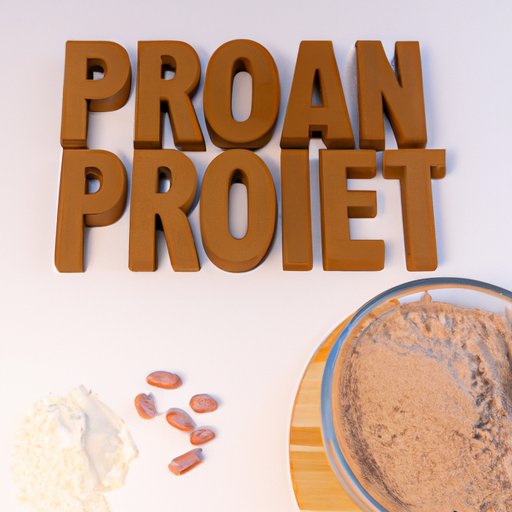
Is High Protein Good for Weight Loss?
High protein diets have become increasingly popular in recent years as a weight loss method. But is there really science behind this trend? In this article, we’ll explore the potential benefits and drawbacks of high protein diets for weight loss, as well as practical tips for incorporating more protein into your diet.
The Science Behind High Protein Diets: Can They Really Help with Weight Loss?
Protein is an essential macronutrient that plays a crucial role in building and repairing tissues in the body. It can also have a significant impact on metabolism and digestion, making it a potential tool for weight loss.
Studies have shown that high protein diets can increase feelings of fullness and satiety, leading to a reduction in overall calorie intake. In addition, protein has a greater thermogenic effect than carbohydrates or fats, meaning that it requires more energy to digest and metabolize. This can lead to a higher overall calorie burn throughout the day.
However, it’s important to note that there are potential downsides to high protein diets as well. Consuming large amounts of protein can put strain on the kidneys, and may lead to nutrient deficiencies if other important nutrients are neglected.
Overall, a balanced approach that incorporates moderate amounts of protein, healthy fats, and complex carbohydrates is often best for weight loss.
5 High Protein Meal Ideas for Effective Weight Loss
There are many easy and delicious ways to incorporate more protein into your meals. Here are five high protein meal ideas to get you started:
1. Grilled chicken salad with mixed greens, cherry tomatoes, and a balsamic vinaigrette.
2. Scrambled eggs with sautéed veggies, such as spinach and mushrooms.
3. Lentil soup with carrots, celery, and onions.
4. Greek yogurt with berries and almonds for added crunch.
5. Tofu stir-fry with broccoli, bell peppers, and brown rice.
Remember to balance your protein intake with other important nutrients, such as healthy fats and complex carbohydrates, for optimal weight loss results.
The Pros and Cons of a High Protein Diet for Weight Loss
As with any diet, there are potential benefits and drawbacks to a high protein approach for weight loss. While protein can increase feelings of fullness and boost metabolism, consuming large amounts of protein can also put strain on the kidneys and lead to nutrient deficiencies if other important nutrients are neglected.
Furthermore, the effectiveness of a high protein approach may vary depending on individual factors such as lifestyle and health conditions. It’s important to consult with a healthcare provider before significantly changing your diet.
Navigating the World of Protein Powders for Weight Loss
Protein powders can be a convenient way to boost your protein intake, especially for those with busy lifestyles. But how do you choose the right one?
There are several different types of protein powders available, including whey, soy, and pea protein. Each has its own pros and cons, such as cost and potential side effects.
When choosing a protein powder, look for high-quality options that have been third-party tested for purity and quality. Read ingredient labels carefully, and opt for powders that are free from artificial sweeteners and other additives.
A Beginner’s Guide to High Protein Diets and Weight Loss
If you’re new to the world of high protein diets, it can be overwhelming to know where to start. Here are a few key concepts to keep in mind:
1. Macronutrients: Protein is just one of three macronutrients that make up our diet, along with carbohydrates and fats. Each plays a crucial role in the body, and finding the right balance is key for weight loss success.
2. Calorie deficits: To lose weight, you need to be in a calorie deficit, meaning that you consume fewer calories than you burn. Protein can help maintain muscle mass and keep cravings at bay, making it an important tool in achieving this deficit.
3. Small changes: Incorporating more protein into your diet doesn’t have to mean a complete overhaul of your eating habits. Start with small changes, such as swapping out your afternoon snack for a protein-rich option like Greek yogurt or a hard-boiled egg.
Understanding Macronutrients: How Protein Helps with Weight Loss
Protein is an essential component of a well-rounded weight loss diet. Along with healthy fats and complex carbohydrates, it can help keep you feeling full and satisfied, while also boosting metabolism and promoting fat loss.
Some types of protein, such as whey protein, have additional benefits, such as muscle-building properties. However, it’s important to choose high-quality protein sources and to incorporate other important nutrients as well for optimal health and weight loss results.
Conclusion
High protein diets can be an effective tool for weight loss, but they should be approached with caution and in moderation. Incorporating more protein into your meals, choosing high-quality protein sources, and staying balanced with other important nutrients are all key for success.
Whether you’re a beginner or a seasoned pro, there are many practical tips and tricks for achieving your weight loss goals with the help of protein.





